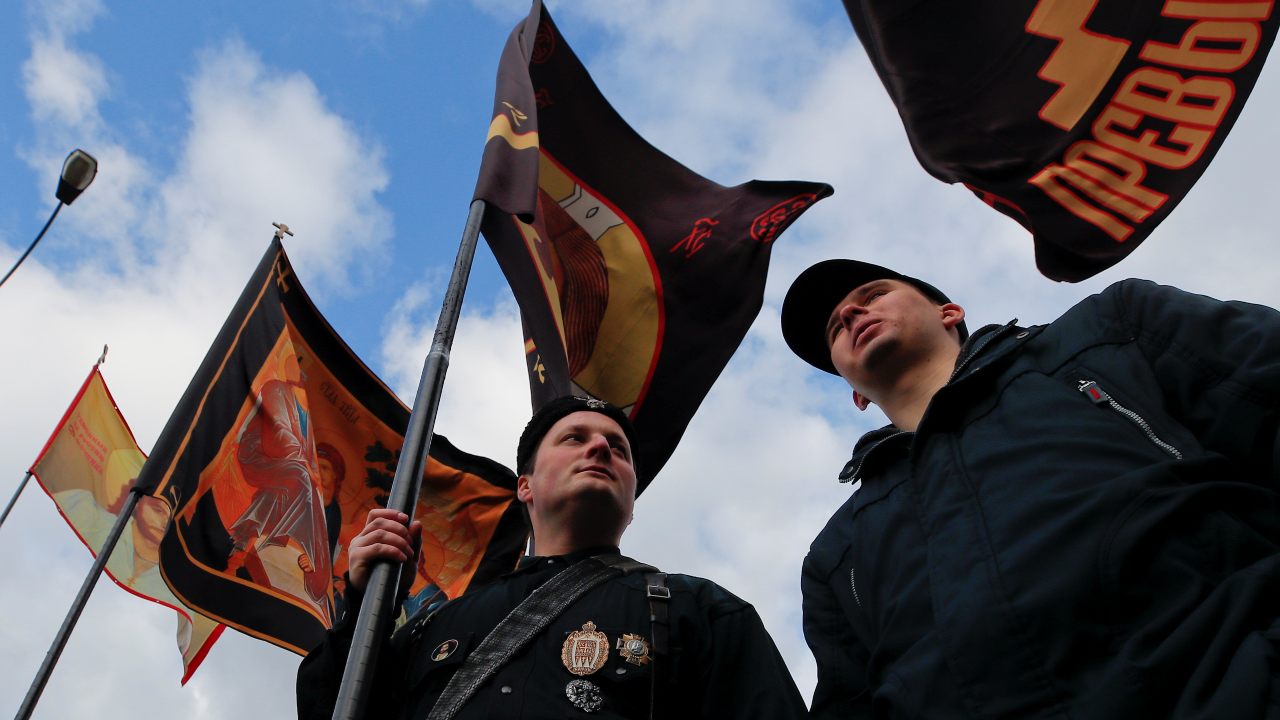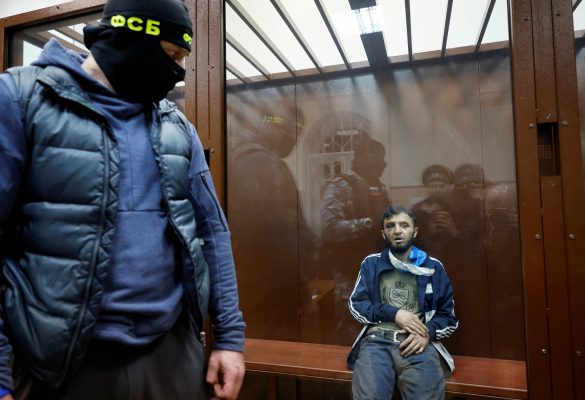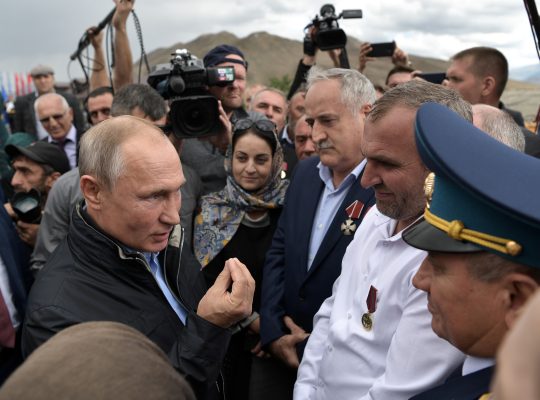Vladimir Putin is very different to Yulia and Alexey Navalny in many respects, but they share at least one thing. They are fans of the Russian blockbuster movie Brat-2 — an exemplar of modern Russian chauvinism, exceptionalism, and anti-Westernism which advances the idea of an eternal fight between a virtuous Russia and a hostile rest-of-the-world.
In January 2021, the opposition leader Alexey Navalny and Yulia were flying to Moscow from Berlin. Navalny had just survived a Novichok attack by Putin’s FSB and was still recovering from the nerve agent. Neither he nor his wife knew that this flight would end with his imprisonment in a brutal Russian facility, but they will have guessed. Both wanted to demonstrate their readiness for the coming fight. Knowing that their every word would be examined in some detail, Yulia — in her seat in the plane next to Alexey —looked at one of the cameras and said: “Boy, bring us some vodka. We’re flying home.”
Those words are unmistakable to most Russians; they are taken from Brat-2.
No one movie or book can truly describe a culture, but Brat-2 is at the very least an essential artefact of modern Russia. Released in 2000, the early dawn of Putin’s period in office, it is not merely a blockbuster; or a movie which Putin regularly quotes; or a movie, whose protagonist Danila Bagrov, formed part of Putin’s 2004 presidential campaign — when as Putin’s portrait was signed with matching “Putin is our president” and Danila’s with “Danila is our brother (Brat)” slogans. It is also a bible of Russia’s self-identification for the last two decades.
The movie’s synopsis is pretty simple. The protagonist, a young man called Danila with a childlike face and sensual lips is an army veteran lost in the prosperous (for some), boomtown Moscow of the late 1990s. He discovers that an army friend has taken a job as a bodyguard and has been murdered by his employer, a mafia boss. Determined to seek justice, Danila goes to the Chicago headquarters of the mafioso’s US business partners. There he discovers that the Chicago-Moscow ring is producing violent videos where Russian girls are sexually abused and then sold to Western pedophiles.
This discovery comes with yet more enemies attached. Ukrainian nationalists and Russophobes — partners of the mafia boss — hunt down Danila. A car dealer in New York — an older man characterized by almost every antisemitic trope — cheats the naïve and good-hearted Danila and takes all his money. Black pimps and gun dealers — characterized by almost every anti-black trope — seek to kill Danila as he tries to save a Russian woman from sexual exploitation.
Thus the movie contains every target of modern Russian nationalism. And, not coincidentally, these are also the groups painted by the country’s media as the eternal enemies of Russia and its traditional values. From Russian hostility to the Black Lives Matter movement or the rejection of political correctness — Brat-2 has it all, with the protagonist cheerily employing the n-word and shooting at a black person, while explaining, “I was taught in school, that the n-word is ok.”
The depictions are not quite as simplistic as good and evil; it transpires that the United States contains good people very much like Russians. Danila’s American sidekick is Ben, a redneck trucker and a genuine man of action, able to help when others stand aside.
Ultimately Russia’s enemies are defeated: the mafia boss loses; Danila’s brother kills a profoundly stupid Ukrainian nationalist; the US border guard is sidestepped; and a Ukrainian-speaking Illinois police officer is brutally beaten.
Putin regularly sprinkles his public pronouncements with quotes from Brat-2. Thus he has repeatedly employed Danila’s words, “the power is in the truth” at his press conferences. In the movie, the words are spoken by the protagonist after he has blasted his way, James Bond-like, into the inner sanctum of the super villain. Americans believe in money, he tells the cringing businessman, while Russians believe in truth, and that’s where they derive their strength. Alexey Navalny used the formula “the power is in the truth” as his final word in court in February 2021 before being jailed on trumped-up charges, having called it “Russia’s most popular political formula” (in his own eyes, Navalny might reasonable have seen himself as Danila and Putin as the mafia boss.
Even now, 22 years after the movie was first released, you can buy a car sticker in Russia with, Danila, a gun, and the slogan “The Power is in the Truth.” Displaying precisely the same casual bravado, Putin told the Valdai political form in 2018 that in a nuclear war “we (Russians) will go to heaven as martyrs, and they (the West) will just perish.” State-controlled Channel One aired a special 20th-anniversary showing last year, describing it as a cult film “in many ways” about Americans, but not for them. A publisher is meanwhile releasing a comic starring Danila this year.
Of course, much of this is knockaround stuff, relying on well-understood (and well-delivered) cinematic cliches of merciless violence. The movie is far from serious, it is no political manifesto — any more than, say Die Hard — and it receives an adulatory 7.8 rating on IMDb.com (other more popular US sites like Rottentomatoes.com don’t acknowledge its existence.) Watching it does not turn the viewer into an ultranationalist.
Yet its themes chime with an identifiably modern nationalism and very clearly strike a nerve in Russian audiences. That’s not to say it the first manifestation of Russian dreams of superiority and the sense of a nation discriminated against by the West, a nation preparing to shake off its handcuffs. It isn’t.
All manifestations of Russian aggression — from the Skripal poisonings to cyber-attacks to military pressure on the West — were perfectly prefigured the later 1990s by the country’s far-right. Take Maxim Kalashnikov, a far-right author who has chosen an assault gun’s name as his alias (his real name is Vladimir Kucherenko). Born in 1966 in Ashgabat, in the Soviet Turkmen republic, Kalashnikov became an author and flooded Russian bookstores with revanchist and extremist anti-Western manifestos, literally saying that the fall of the USSR was a result of a “stab-in-the-back”, the language used by the German far-right after the fall of German Empire in 1918. In his numerous books, Kalashnikov painted the West as Russia’s eternal enemy run by Jews who he called “new nomads.” He sang a song of Soviet military and technological superiority which had been betrayed by cowardly elites, but needed to be restored to create “USSR 2.0.”
Kalashnikov’s ideas on the restoration of Russia’s global power looked freaky in 1990s, as Russia tried to build bridges to the West. He advocated a nihilistic foreign policy of revoking international obligations and wild behavior, but using extremist agents abroad to provide plausible deniability. He urged support for far-right and separatist movements from Texas to Bavaria in order to weaken the West; to invest in hacker groups and to attack Western computer networks, stock exchanges and technology centers; to use the full arsenal of guerrilla war tactics to destabilize NATO; and, most importantly, not to fear Western power, because the West is a paper tiger, while Russia has truth on its side.
The goal of the new Russia would be —Kalashnikov said— the creation of “Russian national socialism” (literally) and restoration of the USSR, including re-occupation of Donbas (which he named “the Heart of Russia”), but also Crimea, Southern Ukraine and the whole “Novorossia” region. Many years later, since Russia occupied Donbas in 2014, Russia’s most pro-Kremlin economic magazine Expert used the same expression “Donbas is the Heart of Russia” on its cover page.
As early as 2007, Kalashnikov (described coyly as a “popularizer of Soviet weapons”) was invited as one of the key speakers to Putin youth movement Nashi’s infamous Seliger lake camp. In 2009, Russian then-president Dmitry Medvedev publicly praised his “ideas on technological development” and urged the government to study them, while noting he was occasionally very rude about the authorities. By 2020, Kalashnikov was editor in chief of Voyenno-promyshlenny kuryer, a Russian media outlet with strong ties to the Russian defense industry.
Kalashnikov is far from alone: others include Yuri Mukhin, the far-right journalist and author, Alexandr Prokhanov, and the fascist thinker Alexandr Dugin, all of whom promote ideas of Russian superiority and advocate action that is swift, brutal, and dispenses with international law.
Russia’s far-right also has foot soldiers. In 2020, a group called the Russian Imperial Movement was designated a terrorist organization. It has been heavily involved in fighting in the Donbas, has a paramilitary wing, and was training foreign extremists in combat techniques. But RIM was designated by the US government, not its Russian counterpart. When asked about it, Putin’s spokesman said “he did not know enough about RIM to comment,” according to the Washington Post.
And extreme right-wing ideas have a home in the mainstream. State-run Channel One, for example, broadcast prime-time reports on the Rothschild family, a familiar code word for antisemitism, which it revealed helps control the world through the Bilderberg club. The pro-Kremlin newspaper KP, the same which cheered Danila as “our brother“, published a column with the headline: “It’s a pity, that Nazis didn’t skin the (Jewish) ancestors of Russian liberals — we would not have problems [with them] today“.
For two decades, the West has largely treated Russian far-right extremism with disdain or branded it marginal. Blockbusting mass culture products like Brat-2 were treated with the same disinterest. But while Putin’s Russia is not a far-right entity, it has nurtured an extremist popular ideology that has sought to convince Russians that the West is effete and corrupt, and needs to be defeated for Russians to prosper. This message has been supported by both corrupt ruling elites, and even opposition activists.
Its success among the Russian people is more questionable. Since 2014, fewer than one in five Russians have wanted a (presumably forced) union with Ukraine, despite Putin’s well-publicized Soviet dreams, a large majority (70%) sometimes or always worry about an impending nuclear war, and almost half the population fears that their own government plans to increase repression against them. This is despite the fact that access to alternative views is very limited; and that state media churns out anti-Western propaganda, while well-crafted movies like Brat-2 are a celebrated aspect of the cultural landscape.
The links between far-right ideas and the policies of Putin’s regime are hard to ignore. They have nonetheless been ignored. They cannot be ignored any longer.
Sergej Sumlenny is a German political expert with a particular focus on security and energy policy in Russia and Eastern Europe. In 2015-2021, he was an office director for Ukraine and Belarus at the German Heinrich-Böll Foundation. He holds a doctoral degree in political science.




